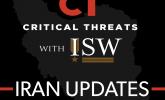Russian Offensive Campaign Assessment, February 21, 2023
February 21, 2023 - ISW Press
Russian President Vladimir Putin’s February 21 address to the Russian Federal Assembly did not articulate specific goals or intentions for the war in Ukraine, instead reinforcing several long-standing rhetorical lines in an effort to buy Putin more space and time for a protracted war. Putin claimed that Russia began the “special military operation” in Ukraine a year ago in order to protect people in Russia’s “historical lands,” ensure Russian domestic security, remedy the threat posed by the Ukrainian “neo-Nazi” regime that he claims has been in place since 2014, and protect the people of Donbas. Putin virulently accused the collective West of arming Ukraine and deploying bases and biolabs close to Russian borders, thereby unleashing the war on Russia. Putin falsely analogized the Ukrainian Armed Forces with various Nazi divisions and thanked the Russian Armed Forces for their efforts in fighting the Nazi threat. The emphasis of a significant portion of the speech was on the supposed resilience of the Russian economic, social, and cultural spheres, and Putin made several recommendations for the development of occupied territories of Ukraine. Putin's speech notably re-engaged with several long-standing Russian information operations regarding the justifications of the war and did not present an inflection in Russia’s rhetorical positioning on the war. Putin could have used this event to articulate new objectives and means for achieving them, such as announcing another formal wave of partial mobilization, redefining the “special military operation” as an official war, or taking additional steps to mobilize the Russian defense industrial base (DIB) in a more concrete way. Instead, Putin said very little of actual substance, likely in order to set continued information conditions for a protracted war in Ukraine by not articulating specific temporal goals and framing the war as existential to the Russian domestic population.










